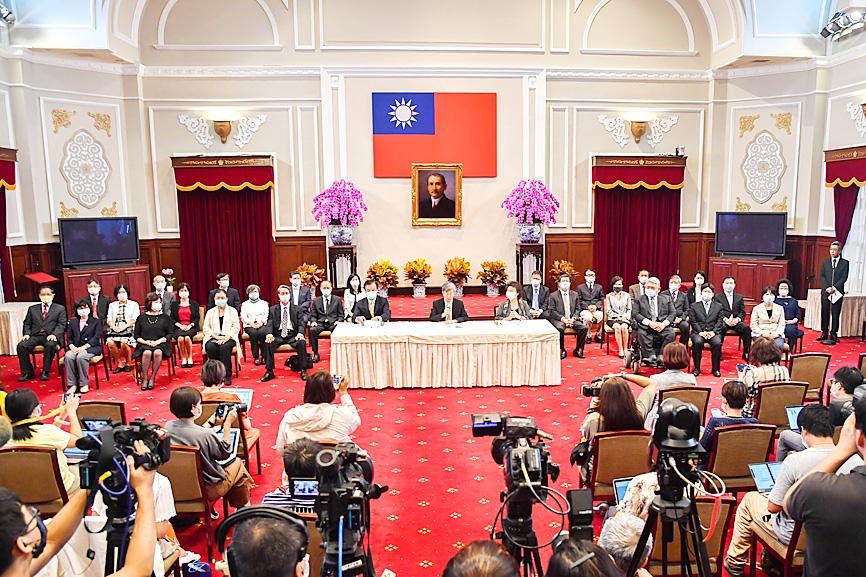The Presidential Office yesterday officially announced its nominations for the Control Yuan, with former Presidential Office secretary-general Chen Chu (陳菊) to head the nation’s top government watchdog and its newly established National Human Rights Commission.
At a news conference at the Presidential Office, Chen announced that she would resign from the Democratic Progressive Party (DPP), saying her new job requires her to transcend party lines.
The Presidential Office had planned to hold a news conference on Friday to announce President Tsai Ing-wen’s (蔡英文) nominations, but that was canceled one hour ahead of its scheduled start after the selection of former Taitung County commissioner Justin Huang (黃健庭) of the Chinese Nationalist Party (KMT) as Control Yuan vice president sparked criticism from politicians across party lines.

Photo: CNA
Huang on Saturday declined the nomination, which was followed by another reported nominee, former New Taipei City deputy mayor Chen Shen-hsien (陳伸賢) of the KMT, also turning down an offer amid criticism that he was impeached by the Control Yuan a decade ago.
The two vacancies would be left unfilled until Tsai submits new nominations, Presidential Office Secretary-General Su Jia-chyuan (蘇嘉全) said.
After becoming Control Yuan president, Chen Chu would head the 10-member National Human Rights Commission, which is also to have seven Control Yuan members and two members to be selected from candidates nominated by commission members who are to serve one-year tenures.
Renominated Control Yuan members are Wang Yu-ling (王幼玲), Kao Yung-cheng (高涌誠), Tien Chiu-chin (田秋堇), Jao Yung-ching (趙永清), Tsai Chung-yi (蔡崇義), Lin Sheng-fong (林盛豐) and Wang Mei-yu (王美玉).
New nominees include Chi Hui-jung (紀惠容), a women’s rights advocate; former legislator Wang Jung-chang (王榮璋); Youth Rights and Welfare Secretary-General Yeh Ta-hua (葉大華); Antonio Hong (鴻義章), a member of the Presidential Office’s Indigenous Historical Justice and Transitional Justice Committee; Taipei Deputy Mayor Chen Chin-jun (陳景峻); Deputy Minister of Health and Welfare Su Li-chung (蘇麗瓊); former deputy minister of education Fan Sun-lu (范巽綠); former DPP legislator Yeh Yi-jin (葉宜津); Supreme Prosecutors’ Office prosecutor Kuo Wen-tung (郭文東); Deputy Auditor-General Wang Li-chen (王麗珍); Ill-gotten Party Assets Settlement Committee deputy-director Shih Chin-fang (施錦芳); National Sun Yat-sen University professor Lin Wen-cheng (林文程); Shih Hsin University professor Lai Ting-ming (賴鼎銘); National Taiwan University College of Medicine professor Hsiao Tsu-yu (蕭自佑); Lai Chen-chang (賴振昌), an accountant; Lin Yu-jung (林郁容), a doctor; National Dong Hwa University College of Indigenous Studies dean Pasuya Poitsonu; and lawyers Lin Kuo-ming (林國明) and Chang Chu-fang (張菊芳).
The Control Yuan is the government branch responsible for investigating and disciplining public servants and agencies. It consists of 29 members appointed by the president and approved by the Legislative Yuan every six years.
The nominations would be sent to the legislature for review and confirmation at an extraordinary legislative session from Monday next week to July 22.
The term of incumbent Control Yuan members ends on July 31 and the newly nominated members would assume their duties from Aug. 1, Su Jia-chyuan said.

Taipei, New Taipei City, Keelung and Taoyuan would issue a decision at 8pm on whether to cancel work and school tomorrow due to forecasted heavy rain, Keelung Mayor Hsieh Kuo-liang (謝國樑) said today. Hsieh told reporters that absent some pressing reason, the four northern cities would announce the decision jointly at 8pm. Keelung is expected to receive between 300mm and 490mm of rain in the period from 2pm today through 2pm tomorrow, Central Weather Administration data showed. Keelung City Government regulations stipulate that school and work can be canceled if rain totals in mountainous or low-elevation areas are forecast to exceed 350mm in

EVA Airways president Sun Chia-ming (孫嘉明) and other senior executives yesterday bowed in apology over the death of a flight attendant, saying the company has begun improving its health-reporting, review and work coordination mechanisms. “We promise to handle this matter with the utmost responsibility to ensure safer and healthier working conditions for all EVA Air employees,” Sun said. The flight attendant, a woman surnamed Sun (孫), died on Friday last week of undisclosed causes shortly after returning from a work assignment in Milan, Italy, the airline said. Chinese-language media reported that the woman fell ill working on a Taipei-to-Milan flight on Sept. 22

COUNTERMEASURE: Taiwan was to implement controls for 47 tech products bound for South Africa after the latter downgraded and renamed Taipei’s ‘de facto’ offices The Ministry of Foreign Affairs is still reviewing a new agreement proposed by the South African government last month to regulate the status of reciprocal representative offices, Minister of Foreign Affairs Lin Chia-lung (林佳龍) said yesterday. Asked about the latest developments in a year-long controversy over Taiwan’s de facto representative office in South Africa, Lin during a legislative session said that the ministry was consulting with legal experts on the proposed new agreement. While the new proposal offers Taiwan greater flexibility, the ministry does not find it acceptable, Lin said without elaborating. The ministry is still open to resuming retaliatory measures against South

1.4nm WAFERS: While TSMC is gearing up to expand its overseas production, it would also continue to invest in Taiwan, company chairman and CEO C.C. Wei said Taiwan Semiconductor Manufacturing Co (TSMC) has applied for permission to construct a new plant in the Central Taiwan Science Park (中部科學園區), which it would use for the production of new high-speed wafers, the National Science and Technology Council said yesterday. The council, which supervises three major science parks in Taiwan, confirmed that the Central Taiwan Science Park Bureau had received an application on Friday from TSMC, the world’s largest contract chipmaker, to commence work on the new A14 fab. A14 technology, a 1.4 nanometer (nm) process, is designed to drive artificial intelligence transformation by enabling faster computing and greater power